1. What is the company culture like?
The first question to ask when interviewing with a potential employer is about the company culture. It’s important to understand the values and beliefs of the organization you may be working for, as well as the work environment. You want to make sure that you align with the company culture and that it will provide you with a positive work experience.
2. How does the team collaborate?
Another important question to ask is about how the development team collaborates. Unreal Engine projects often require cross-functional collaboration, so it’s important to understand how the different departments work together. This can include asking about communication tools and processes, as well as any challenges or successes you may expect in working with your colleagues.
3. What is the project timeline?
One of the most crucial questions to ask during an Unreal Engine developer interview is about the project timeline. You want to understand how long the project will take, what are the milestones and deadlines, and what kind of expectations you can have in terms of progress. It’s important to make sure that the timeline is realistic and achievable, as well as align with your own career goals and priorities.
4. What is the team’s experience with Unreal Engine?
Before accepting a job offer, it’s important to ask about the team’s experience with Unreal Engine. You want to understand if the company has worked with Unreal Engine before and what their experience was like. This will give you an idea of what you can expect from working with this technology and what kind of support you can expect from your colleagues.
5. How is performance evaluated?
It’s important to understand how performance is evaluated in a Unreal Engine developer role. You want to know what metrics are used to measure success, such as completion rates or quality of work, and how these metrics are communicated to the team. This will help you understand what’s expected of you in terms of meeting goals and expectations.
6. What opportunities for learning and growth are available?
As an Unreal Engine developer, it’s important to have opportunities for learning and growth. You want to ask about any training or mentoring programs that are available, as well as the potential for career advancement. This will help you understand what kind of investment the company is making in your professional development and how this aligns with your own career goals.
7. What is the workload like?
It’s important to ask about the workload during an Unreal Engine developer interview. You want to understand if it’s a high-pressure environment or if there are opportunities for a good work-life balance. This will help you determine if the role is a good fit for your lifestyle and priorities.
8. What are the expectations for communication?
Clear communication is essential in any development team, especially when working with Unreal Engine. It’s important to ask about the expectations for communication during an Unreal Engine developer interview. This can include asking about regular check-ins with supervisors or team members, as well as how feedback and constructive criticism are handled.
9. What is the company’s approach to remote work?
With the rise of remote work in recent years, it’s important to understand a company’s approach to remote work during an Unreal Engine developer interview. You want to ask about policies and procedures related to working remotely, such as communication tools, expectations for availability, and how progress is tracked. This will help you determine if the role can accommodate your needs and lifestyle.
10. What are the benefits?
Finally, it’s important to ask about the benefits of working at the company during an Unreal Engine developer interview. This can include things like health insurance, retirement plans, paid time off, and other perks. This will help you determine if the job is a good fit for your personal and professional goals.
In conclusion, asking these key questions during Unreal Engine developer interviews can help you better understand the company culture, workload, and expectations of the position. By carefully evaluating the responses to these questions, you can make an informed decision about whether the job is right for you. Remember that it’s important to prioritize your own career goals and lifestyle when making job decisions, as well as considering the needs and priorities of the company you are interviewing with.
